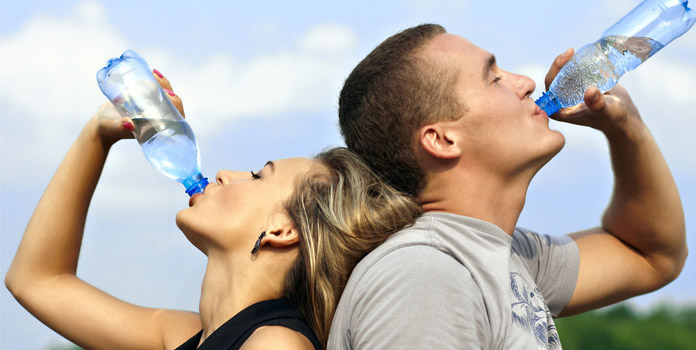
What to Eat Before Running – Run Forrest Run! Run Forrest Run! Remember this iconic dialogue from an equally iconic movie Forrest Gump? Of course, you do. One of the most important lessons you can learn from Forrest Gump is to run regularly. After all, running does not need any equipment apart from shoes and a will to sweat hard.
Related: Healthy Eating Rules.
However, you also need to determine if you need to fuel your body before a run and decide what to eat before running. There are so many running advices spread across the internet about nutrition for running that at times it becomes confusing to make a final decision.
But you need not worry as we have got you covered. Follow these five ironclad rules which will help you decide what to eat before running:
Contents
1. Determine Your Exact Need of Food Before Eating
 You do not have to follow blindly any advice about what to eat before running. First, understand that one eats before running to meet energy demands as food will supply calories to the body.
You do not have to follow blindly any advice about what to eat before running. First, understand that one eats before running to meet energy demands as food will supply calories to the body.
However, your body will burn those calories differently from the other person so what works for somebody else might not work for you. Accordingly, you may not need many calories if you are a runner with average built as compared to a marathon runner.
Moreover, the number of calories you will burn will depend on your current weight and the intensity of your running.
For example, if you are about 150 pounds, you will roughly burn between 500-700 calories during running for an hour depending on the intensity and effort. So, you may only need a small amount of pre-run snack with low to medium carbohydrate levels instead of a carb heavy meal or high energy drink before running.
Related : Best Healthy Diet Plan
2. Time of Eating is Equally Important as What To Eat Before Running
 Instead of asking what to eat before a run, you should first ask when I am going to run. This is because your timing of eating is going to be a crucial factor in deciding the efficiency of your run. Moreover, what you eat before running will also depend on the time at which you are eating.
Instead of asking what to eat before a run, you should first ask when I am going to run. This is because your timing of eating is going to be a crucial factor in deciding the efficiency of your run. Moreover, what you eat before running will also depend on the time at which you are eating.
So for example, if you are running early in the morning after waking up, your body is low in glycogen after staying in starvation mode for 7-8 hours. You can even go on a run without eating anything if you do not plan on running for more than 45-60 minutes. This can also lead body to use fat as fuel and hence help in fat loss.
However, if you plan to run for a longer time, you should eat something to avoid fatigue and lack of energy after some time. Not eating anything before running can also reduce the efficiency of your run.
So, aim for having a light snack such as oatmeal with low-fat milk 30-45 minutes before the run. If you do not have time, you can have a fruit before 15-20 minutes of running. Fruits contain glycogen which will give you energy while running.
If you are going to run in late afternoon or evening, you should aim to have lunch at least before 2-3 hours. Try to include a mix of carbohydrates and protein in the ratio of 3:1 or 4:1. Carbohydrate rich food like rice, pasta, whole wheat will fulfill your energy needs during run whereas protein will help to repair damage muscles. This should be sufficient for a run lasting for 45-60 minutes.
If you plan on running longer than that, you can have an additional medium sized snack after lunch but before 1-2 hours of running. You can have a banana sandwich, granola bar with yogurt, oatmeal with milk, or fruit salad with yogurt for this purpose.
The whole idea is to have snacks with a comparatively high glycemic index so that they can get absorbed quickly and release energy into the body.
3. Say No to Fiber Rich Foods Before Running
 Fiber rich food is an amazing thing to include in your daily diet as it is full of complex carbohydrates. These carbohydrates are extremely beneficial to the overall health of the body. However, they take some time to digest and do not provide energy immediately.
Fiber rich food is an amazing thing to include in your daily diet as it is full of complex carbohydrates. These carbohydrates are extremely beneficial to the overall health of the body. However, they take some time to digest and do not provide energy immediately.
Also Read: Heart Healthy Food.
When you are going for a run, you are going to need energy in the form of glucose obtained after the processing of carbohydrates in the body. However, fiber-rich foods cannot provide this instant energy as they are tough to digest quickly.
Moreover, they also engage your digestive system and make it sluggish. You may even feel discomfort during running if you have consumed fiber rich item earlier.
That is why fitness experts never recommend people to eat fiber foods before running. Instead, you should aim to have foods with simple carbohydrates which can provide energy immediately.
However, if you are going to run for more than 60 minutes, you should also eat some foods with complex carbohydrates. These will ensure that energy is released gradually for the whole period of your run.
4. Say Yes to Water And Electrolytes
 Your body loses a copious amount of vital fluids in the form of sweat when you go on a run or do any other exercise. This can lead to a risk of dehydration especially when you are going to run a race. So, you should drink an adequate amount of water throughout the day.
Your body loses a copious amount of vital fluids in the form of sweat when you go on a run or do any other exercise. This can lead to a risk of dehydration especially when you are going to run a race. So, you should drink an adequate amount of water throughout the day.
Also Read: How Much Water Should You Drink A Day.
However, you should also consume electrolytes to fulfill the need of essential minerals which are lost from the body through sweat. These minerals which mostly include sodium and potassium also help in avoiding those nasty cramps and other stomach issues while running.
Coconut water provides abundant potassium and is easily digestible in the body. So, you can take it before your runs to minimize potassium loss. In addition to it, tart cherry juice is another great option to include it in your fluids. It will prevent not only dehydration but also muscle damage and soreness by reducing inflammation.
5. Do Not Listen to Us or Anybody Else, Listen to Your Body
 Yes, this is true when it comes to any exercise. Everyone’s body is different, and no diet or nutrition can be generalized for a particular individual. Some people find banana the best food to eat before a run whereas others start suffering from stomach ache after eating it.
Yes, this is true when it comes to any exercise. Everyone’s body is different, and no diet or nutrition can be generalized for a particular individual. Some people find banana the best food to eat before a run whereas others start suffering from stomach ache after eating it.
Similarly, some people do not like to eat anything at all before running as they feel too heavy and nauseous after eating before running. Some people feel the opposite and cannot run for long on an empty stomach. So, there is no one fixed rule of eating before running. Experiment and try to find out what works and what does not work for your body.
By following these above five basic rules, you can quickly decide and plan what to eat before running. In this way, you will increase the efficiency and effectiveness of your running without feeling tired or hungry in between.
Also Read : 23 Best Running Tips to Help You Run Better and Faster
